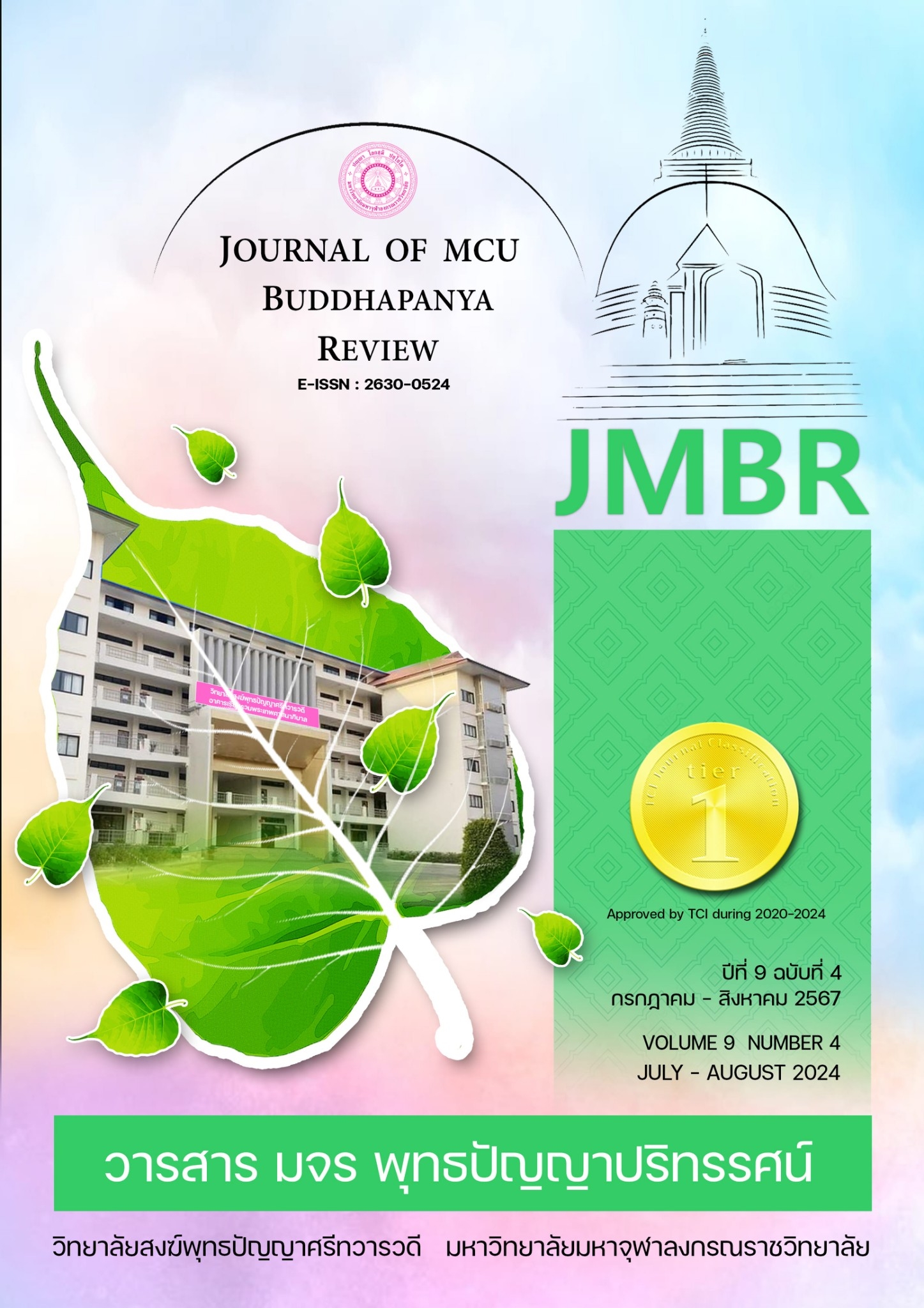The Sufficiency Economy Philosophy Influencing Happiness Level : A Comparative Analysis Using Six Ranking Factors in Thailand Among Top Asean Nations
คำสำคัญ:
World Happiness; , Six Ranking Factors; , ASEAN Nations; , Sufficiency Economy Philosophy; , Influencing Happiness;บทคัดย่อ
Research objectives, to validate the Six Ranking Factors of the World Happiness Report during 2022-2023 through survey and research development, to comparative analyses among ASEAN nations, and to determine the other possible primary factors that impact happiness in Thailand. This study expands upon the World Happiness Report including its methodologies, findings, and methods for measuring happiness. Qualitative research with secondary data related data sources about knowledge associated with the World Happiness Report towards Sufficiency Economy Philosophy (SEP). Primary data collected from the group of native citizens who have lived in Top ASEAN countries, including Singapore, Malaysia, and Thailand, which currently hold the top three happiest countries in ASEAN nations, will share their level of happiness living in each country and their opinion on six ranking factors of World Happiness Report. The SEP has been considered to determine whether or not this aspect could impact Thailand's level of happiness. To provide use the Six Ranking Factors of World Happiness Report Factors included of Healthy GDP per Capita, Healthy Life Expectancy, Freedom of Choice, Generosity Levels, Social Support, and the Perception of Corruption to Happiness Outcomes. The World Happiness Report's ranking factors can be used to compare the degree of happiness among nations, but other potential elements could also have a significant impact on the happiness of citizens in a certain period of time that will be reviewed in this research. The success factors of Sustainable Happiness of Thai People through the application of the principles of a Sufficiency Economy Philosophy (SEP). A socio-economic concept that was originally presented to the Thai people by their King, His Majesty King Bhumibol Adulyadej Rama IX of Thailand, in the late 20th century, is the philosophy that is still primarily followed by Thai citizens today.
เอกสารอ้างอิง
Carmen Ang. (2022). Mapped: Global Happiness Levels in 2022, Published March 18, 2022. Retrieved from: https://www.visualcapitalist.com/mapped-global-happiness-levels-in-2022/.
Helliwell, J. F., Layard, R., Sachs, J. D., Neve, J.-E. D., Aknin, L. B., & Wang, S. (2022). World happiness report 2022. The World Happiness Report. Retrieved from https://worldhappiness.report/ed/2022/ (Accessed: 10 November 2023).
ITN Business. (2024). World Happiness Report 2024: Which countries are the happiest? Retrieved from https://business.itn.co.uk/world-happiness-report-2024-which-countries-are-the-happiest-in-the-world/.
Kumar Vivek, I. (2023). Decoding India’s happiness conundrum: Why the world happiness report fails to capture the true essence of India’s well-being’, LinkedIn. Retrieved from https://www.linkedin.com/pulse/decoding-indias-happiness-conundrum-why-world-report.
Pallavi Rao. (2024). Published 2 months ago on March 20, 2024. Retrieved fromhttps://www.visualcapitalist.com/a-map-of-global-happiness-by-country-in-2024/
Penpim P, Supaprawat S, Siriporn P, Nuttharin P, and Vilasinee K. (2024). Enhancing Community Economic Sustainability Based on Cultural Capital and Local Wisdom Knowledge Management: A CaseA of Klong Maduea, Samut Sakhon. Journal of MCU Buddhapanya Review Vol. 9 No.2. P.1-16.
Phratammasakawongvisutthi. (2022). Five principles of civilization. Photocopied documents. World Buddhist University. 2022. Cited in Phra Dhamma Sakyawongwisut. and the Faculty of Sustainable Agronomy Society that leads to society “Longevity Economy” and “Longevity Dividend” analytical approaches to study the connection Photocopied documents. World Buddhist University. 2023.
Puchiss S, Kritsana D, and Sittiporn K. (2024). Developing employees' happiness in the workplace in Pathum Thani Province. Journal of MCU Buddhapanya Review Vol. 9 No.2. P.225.
Royal Initiative. (2023). Philosophy of Sufficiency Economy. Retrieved from www.pidthong.org/philosophy.php.
The Journalist Club. (2021). Royal speech "Ariyakaset/Sustainable Agronomy" of His Majesty the King. Retrieved from https://thejournalistclub.com.
Royal Initiative. (2023). Philosophy of Sufficiency Economy. Retrieved from www.pidthong.org/philosophy.php.
Sarapirom, K. and Sarkar, H. (2018). Study of sufficiency economy philosophy and its impact on individuals, communities and organizations, Interdisciplinary Research Review. Retrieved from https://ph02.tci-thaijo.org/index.php/jtir/article/view/126179.
SDG Move. (2024). Moving forwards Sustainable Future. Retrieved fromhttps://www.sdgmove.com/2024/05/09/sdg-updates-seminar-highlights-05-nrct-artnership/.United Nations Thailand. (2022).
Uuk, R. (2020). Critical Assessment of the World Happiness Report’s Public Conception of Well-Being. Retrieved from https://ristouuk.com/wp. content/uploads/2020/04/
World Happiness Report. (2022). World Happiness Report 2022. Retrieved from https://worldhappiness.report/ed/2022/.
World Happiness Report. (2023). World Happiness Report 2023. Retrieved from https://worldhappiness.report/ed/2023/.
World Buddhist University. (2023). Continuing, Sustainable, Development towards becoming Noble
Happiness according to the goals of balanced development. Retrieved from https://wbu.world/wbu-conferences-seminars/septosdgs/.
World Happiness Report. (2024). World Happiness Report 2024. Retrieved from:https://worldhappiness.report/ed/2024/
Zhou, W. (2024). Why are some countries happier than others?, Wysa. Retrieved from:https://blogs.wysa.io/blog/depression/
ดาวน์โหลด
เผยแพร่แล้ว
รูปแบบการอ้างอิง
ฉบับ
ประเภทบทความ
สัญญาอนุญาต
ลิขสิทธิ์ (c) 2024 วารสาร มจร พุทธปัญญาปริทรรศน์

อนุญาตภายใต้เงื่อนไข Creative Commons Attribution-NonCommercial-NoDerivatives 4.0 International License.



